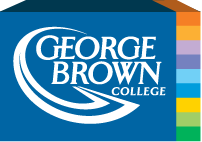About Blockchain Development Program in George Brown College
FULL DESCRIPTION
Looking to transition careers or fill in the gaps to gain advanced blockchain development skills?
This unique Blockchain Development program at George Brown College in Toronto focuses on designing and implementing decentralized applications by leveraging blockchain technology. The three-semester program is designed to also thoroughly cover full stack development to give potential students all the tools they need to succeed in this emerging and exciting field.
This program has been developed with the support of blockchain industry professionals and is taught in a full-time executive format of approximately 20 hours per week of study over a 26-week time period. Co-op and work integrated learning opportunities are available during the third semester of the program. It is the first certificate in blockchain offered by a Canadian college.
The skills you’ll learn include:
- Smart contracts
- Design patterns for blockchain
- Distributed applications (dApps)
- Full stack development
- Blockchain architecture, security practices, laws and regulations, and more
PROGRAM STANDARDS AND LEARNING OUTCOMES
The graduate has reliably demonstrated the ability to:
- Communicate essential concepts related to blockchain technology and its industry applications.
- Implement best security practices for blockchain solutions.
- Design cryptoeconomic models to solve business problems.
- Design the architecture of decentralized applications and systems.
- Develop decentralized applications leveraging blockchain technology.
- Explain the legal implications, regulations, and industry standards that are relevant to blockchain technology.
- Apply IT project management principles and best practices.
- Contribute to the field and blockchain community through various open source projects, partnerships, and community involvement.
YOUR CAREER
Graduates of this program may apply for positions that include:
- Blockchain Engineer
- Blockchain Developer
- Blockchain Architect
- Smart Contract Developer
- dApp Developer
Academic qualification equivalents
- Two- or three-year Diploma or Bachelor's Degree in Information Technology, Computer Science or a related field.
English language requirements (one of the below):
- IELTS : 6.0, minimum 5.5 in each skill band
- TOEFL : 80 (online) minimum 20 in each skill band
- PTE : 54, overall minimum 50 in each skill band
George Brown College Highlights
| Type of College |
Public |
| Campus Setting |
Urban |
| Location |
Toronto, Ontario, Canada |
| Number of Campuses |
3 + 3 (location/centers) |
| Type of programs |
Certifications, Diploma, Degree, and Continuing Education |
| Number of full-time students |
32,000 + |
| Number of part-time students |
3,000 + |
| %age of International Students |
17% |
| Official Website |
www.georgebrown.ca |
George Brown College The Average Tuition Fees And Other Expenses
| Student Type |
Tuition Fee |
| Canadian students |
2780 - 15310 USD(two semesters) |
| International Students |
11,320 - 23,900 USD(two semesters) |
Tuition fees for some of the popular programs offered by George Brown College are mentioned below
| Course Name |
Tuition Fee(USD) |
| B.Com |
6,052 |
| B.Tech |
7,272 |
| BSN |
5,430 |
| Wireless Network(Postgraduate) |
4,365 |
| Construction Management(Postgraduate) |
6,183 |
| Marketing Management(Postgraduate) |
4,176 |
Residence Fees
Although rents may vary depending on quality and location, most rents listed by the Housing Service are within the following ranges:
| Accommodation Type |
Rent |
| Shared Accommodation |
500 - 700 USD per month |
| One - Bedroom Apartment |
900 - 1,200 USD per month |
| Two - Bedroom Apartment |
1,100 - 1,500 USD per month |
| Three - Bedroom Apartment |
1,300 - 1,800 USD per month |
Meal Plans
The college provide three types of meal plan options its students, the details of which are mentioned below:
| Plan Name |
Cost |
| Annual Swipe & Save Plan |
1700 USD |
| Semester Swipe & Save Plan |
850 USD |
| Swipe & Save Reloadable Card |
400 USD |
